Cleanliness and hygiene are crucial for hotels. With guests coming from all over the world, hotels must maintain high standards of sanitation to prevent the spread of illness. Poor hotel hygiene can quickly lead to negative reviews and damage a hotel’s reputation. This guide will examine best practices for improving hotel hygiene.
- Importance of Hotel Hygiene
- Key Areas to Keep Clean
- Staff Training
- Products and Equipment
- Developing a Hygiene Plan
- Inspecting for Cleanliness
- Utilizing Technology
- Partnering With a Cleaning Company
- Eliminating Odors
- Communicating With Guests
- Encouraging Guest Participation
- FAQ About Improving Hotel Hygiene
- Conclusion
Importance of Hotel Hygiene
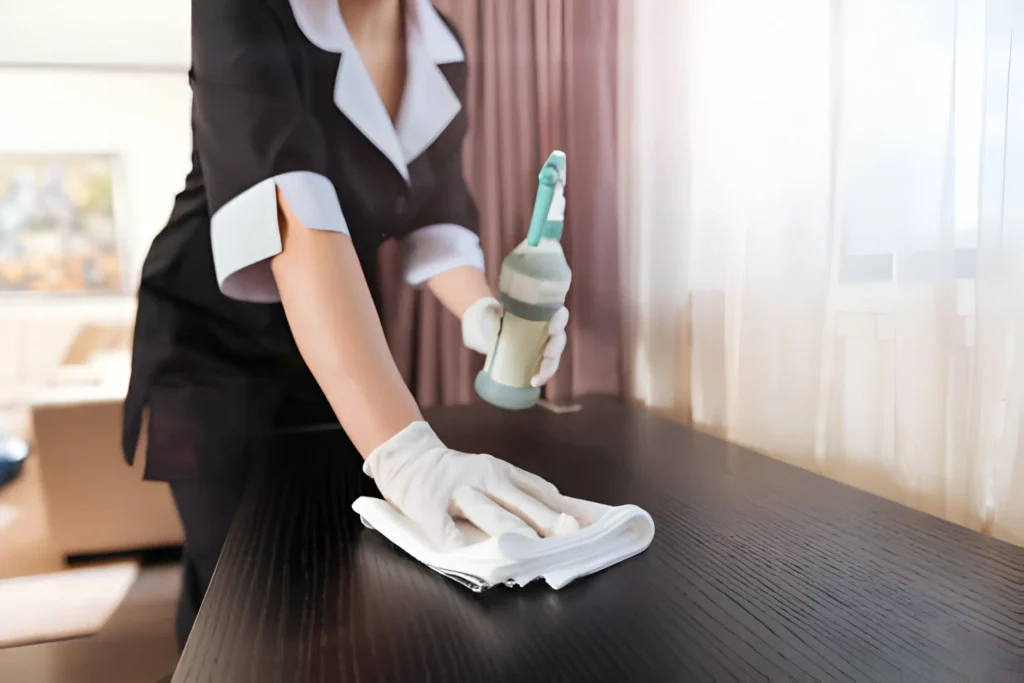
Maintaining proper hotel hygiene should be a top priority for every hotel. Here are some key reasons why hotel cleanliness matters:
Prevents Illness
Germs from unclean surfaces or improperly washed linens can cause guests to become sick. Norovirus outbreaks are often traced back to contaminated hotel settings.
Creates Good First Impressions
The first thing guests notice is how clean and tidy a hotel appears. Dirty lobbies, rooms, or bathrooms create a bad first impression.
Improves Online Reputation
Reviews mentioning dirty conditions will lower a hotel’s ratings. Cleanliness is one of the top factors potential guests consider.
Reduces Risk
Poor sanitation puts hotels at increased risk for pests, viruses, bacteria growth, and other health hazards. Proper hotel hygiene is essential for safety.
It’s the Law
Hotels must comply with health department regulations. Lapses in cleanliness can result in citations, fines, or even closure.
Key Areas to Keep Clean
Hoteliers should focus on these key areas to optimize cleanliness:
Guest Rooms
Guest rooms should be thoroughly cleaned between each stay. It is also an important factor in hotel hygiene.
Beds: All linens, including sheets, pillowcases, blankets, and bedskirts, should be washed at high heat. Mattresses and pillows should be spot-cleaned.
Bathrooms: Disinfect all hard surfaces. Clean hair and soap scum from showers and tubs. Disinfect toilets, sinks, floors. Restock toiletries.
Furniture: Disinfect TV remotes, phones, doorknobs, cabinets, dressers. Vacuum carpets and mop hard floors.
Trash: Remove all garbage and replace liners. Check for any discarded food or items.
Common Areas
Public spaces require constant upkeep. Develop schedules for cleaning items based on traffic frequency.
Lobby: Disinfect the front desk, doors, elevators, luggage carts, seating areas. Vacuum mop floors. Remove trash promptly for best hotel hygiene results.
Fitness Center: Disinfect exercise machines, weights, and accessories after each use. Stock sanitizing wipes and sprays.
Pool Area: Test and adjust chlorine levels. Skim debris, vacuum. Sanitize chairs, tables, and towels with approved products.
Meeting Rooms: Wipe down tables, chairs, and shared equipment between events. Vacuum the carpet, and take out trash.
Dining Areas
Restaurants, bars, and food service areas require meticulous attention.
Kitchen: Keep all surfaces sanitized. Ensure cold foods are kept below 40°F. Hot foods above 140°F. Practice safe food prep.
Dining Room: Buses tables promptly after diners leave. Disinfect tables, chairs, and highchairs. Vacuum after meals.
Room Service: Employees wash their hands frequently. Disinfect carts dishware. Ensure proper food temperatures.
Bar: Disinfect counter, stools, and beverage equipment regularly. Provide pre-portioned snacks or disinfect shared bowls often.
Breakfast Buffet: Keep hot foods hot and cold foods cold. Frequently replace shared utensils. Disinfect counters and serving stations.
Staff Training
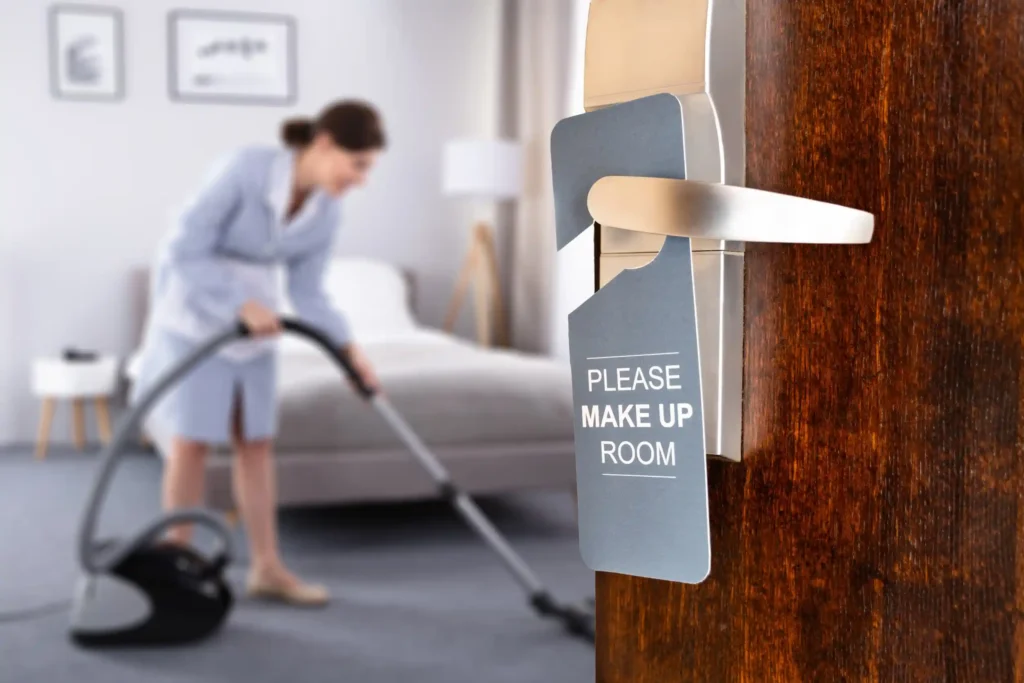
Well-trained staff are essential for maintaining hotel hygiene. Employees should:
- Know proper cleaning procedures and use approved products
- Change mop heads, rags, and gloves frequently
- Report any mold, leaks, or other issues
- Follow hand-washing protocols, including washing after cleaning, before serving food, and after handling trash.
- Stay home if ill with cold, flu, or other contagious diseases.
Conduct regular refreshers on hotel hygiene standards. Post reminders for hand washing in staff areas. Welcome employee suggestions on improving procedures.
In addition to diligent cleaning procedures, hotels should also focus on proper hygiene training for staff. The Crown Inn Hotel in Multan provides an excellent example of in-depth health and safety education for employees, helping ensure the highest hotel hygiene standards are met.
Products and Equipment
Using the right tools makes cleaning easier. Stock inventory with:
- Disinfectant wipes and sprays are EPA-approved for use against viruses
- Vacuums with HEPA filters to capture allergens
- Microfiber cloths and mops that are highly absorbent
- Colour-coded gloves to avoid cross-contamination
- Touchless hand sanitizer dispensers
- Steamer sanitizers to refresh soft surfaces like upholstery
- EPA-approved cleaning solutions for different needs
Provide housekeepers with well-functioning carts stocked with needed supplies. Make sure laundry facilities have sufficient capacity and supplies.
Developing a Hygiene Plan
A clear hotel hygiene plan is key to execution. Hoteliers should:
- Assign responsibility for maintaining standards
- Document procedures for cleaning all areas
- Set schedules for tasks like vacuuming, sanitizing surfaces, emptying trash
- List protective equipment needed
- Establish procedures for handling illness outbreaks or hygiene lapses
- Outline training plan for new hires and refreshers
- Develop maintenance schedule for HVAC systems and appliances
- List approved cleaning products and where they should be used
Post reminders for staff on proper hand washing guidelines and hygiene policies. Maintain cleaning records to track the completion of tasks.
Inspecting for Cleanliness
Regular inspections ensure standards don’t slip. Managers should:
- Do random spot checks of rooms in public areas. Look for dust, debris, Mold, smells
- Ensure cleaning supplies are stocked and organized
- Confirm schedules and training up to date
- Request feedback from staff on needs
- Check for functioning equipment like vacuums, laundry, HVAC
- Review ratings and customer comments about cleanliness
- Follow up on any employee illness reports
Troubleshoot any problem areas identified. Update policies and training as needed.
Utilizing Technology
Technology can supplement cleaning efforts. Consider these options:
- Handheld UV sanitizers to disinfect surfaces and objects
- Steam cleaners to sanitize soft surfaces and upholstery
- Smart thermometers for monitoring food temperatures
- Automated hand sanitizing stations
- Electrostatic sprayers to completely coat surfaces with disinfectant
- Ozone generators sanitize air and surfaces without chemicals
- Blacklights to identify any residual dirt or stains
- Digital logs for tracking completed cleaning tasks
Evaluate if tech solutions fit needs and budget. Properly train staff on using any new equipment.
Partnering With a Cleaning Company
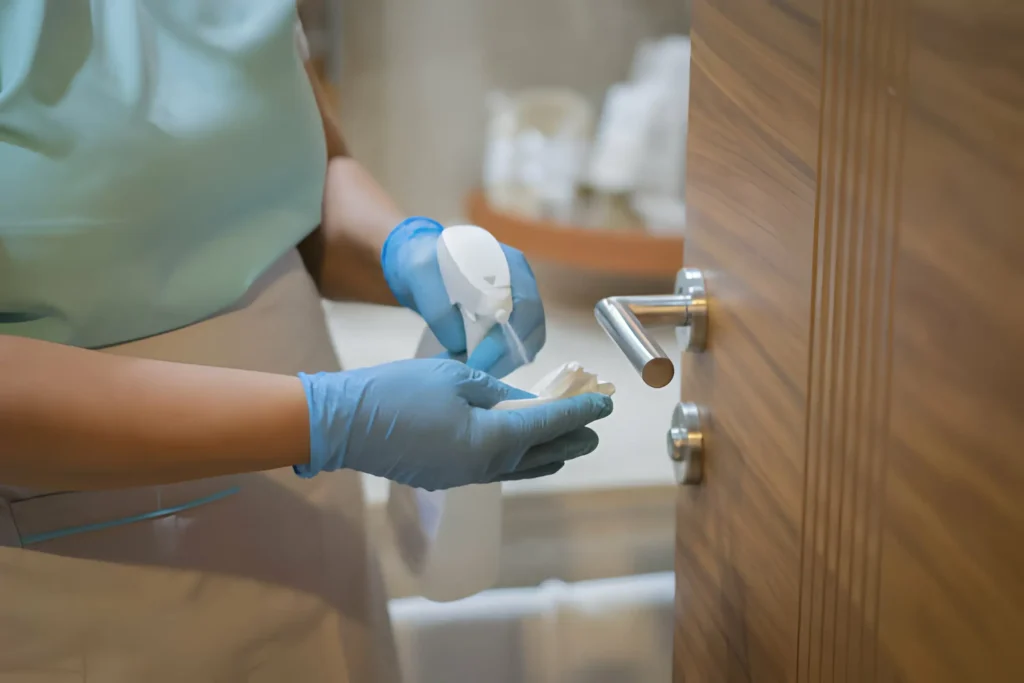
Some hotels hire professional cleaning services to handle tasks like:
- Deep cleaning guest rooms
- Janitorial services for public areas
- Laundering linens and towels
- Sanitizing kitchens and dining spaces
- Pressure washing exterior areas
- Cleaning carpets and upholstery
Vet companies thoroughly. Review their employee screening and training procedures. Schedule regular meetings to ensure they follow hotel guidelines.
Eliminating Odors
Bad smells erode trust in cleanliness. Address odors through:
- Promptly emptying trash and replacing liners
- Clearing drain pipes to prevent build-up
- Using deodorizers in carpet and upholstery cleaners
- Deploying air purifiers and ventilating rooms
- Switching to odor-eliminating products
- Baking soda in fridge closets to absorb smells
- Checking for mold or mildew and eliminating the source
- Fixing leaks that can cause musty smells
- Having the HVAC system serviced regularly
Notice any restaurant or common area smells guests might encounter. Masking odors instead of eliminating the source is not effective.
Communicating With Guests
Transparency about cleanliness fosters guest confidence. Strategies include:
- Detailed cleaning info on the website and at check-in
- Explaining extra disinfection steps if the guest was recently ill
- Listing cleaning products and technologies used
- Describing staff training standards
- Encouraging feedback on cleanliness
- Responding promptly if cleanliness issue arises
- Posting work schedules showing staff coverage
Promote hotel hygiene initiatives on social media. Highlight staff and guest participation in the #CleanTraveler pledge.
Encouraging Guest Participation
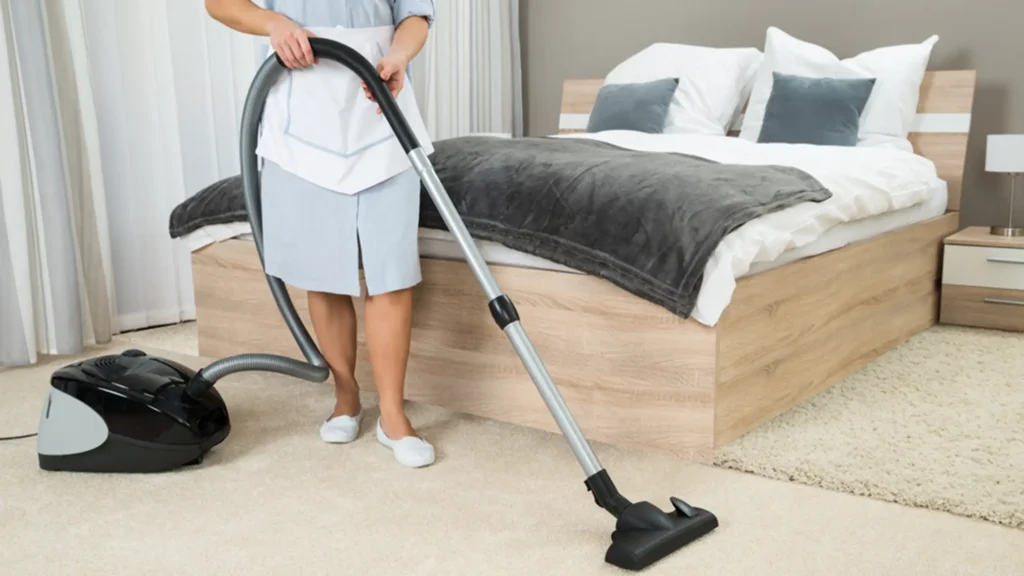
Guests play a role in hotel hygiene as well. Hotels can:
- Have hand sanitizer easily accessible
- Provide wipes for wiping personal items brought into guest rooms
- Post signage on proper hand-washing techniques
- Request guests notify staff if feeling ill
- Discourage coming to breakfast if you are not feeling well
- Suggest guests wear masks when utilizing common areas
- Share steps taken if a guest has a contagious illness
- Ask for notification if the guest develops symptoms after a stay
By working together, hotels and guests can create a safer, healthier travel experience.
FAQ About Improving Hotel Hygiene
Guests may have questions about hotel hygiene and safety practices. Be prepared to address:
How often are rooms cleaned between guests?
Rooms should be thoroughly cleaned, disinfected, and aired out before a new guest arrives. All linens and surfaces must be sanitized. Housekeepers have detailed checklists to ensure no area is overlooked.
How often are common areas like lobbies cleaned?
High-traffic public areas are cleaned multiple times per day. Surfaces are disinfected, carpets vacuumed, and trash removed promptly. Staff are scheduled to keep lobbies cleaned and sanitized.
Are extra steps taken if a guest has a contagious illness in a room?
If we are alerted a guest has an illness, their room receives an extra disinfection protocol. All surfaces are sanitized with approved, hospital-grade disinfectants per CDC guidelines. We remove all used linens and sanitize the HVAC system. Room left vacant for additional time before next guest.
How do you ensure laundry is fully sanitized?
Our commercial washers used intense heat and approved cleaning agents to sanitize all linens fully. We use high-temperature dryers and irons to add extra disinfecting. Our staff are trained on the safe handling of bedding and linens per sanitation standards. We replace damaged or questionable items immediately.
How does the hotel ensure food safety?
Our kitchen staff maintains top food safety, including wearing masks and gloves, disinfecting surfaces, proper temperature monitoring, preventing cross-contamination, high standards of personal hygiene, and proper washing of any produce. Our dining areas are cleaned stringently between guests.
What if I notice a cleanliness issue during my stay?
Please notify the front desk immediately if you have any concerns about cleanliness or hygiene during your stay. We will resolve the issue and may offer to move you to a new room if needed. Your satisfaction is our top priority. Feedback helps us improve.
Proper hotel hygiene requires diligence, staff training, and oversight. By following best practices, hoteliers can keep guests healthy and enhance their brand reputation through spotless, sanitary properties. A clean hotel communicates caring and earns trust. When guests see dirt or odors, it raises questions. Consistent excellence in cleanliness should be every hotelier’s goal.
Conclusion
Maintaining excellent hotel hygiene requires ongoing effort but pays dividends in guest satisfaction. By training staff thoroughly in cleaning procedures, using effective products and technology, communicating transparently, and inspecting regularly, hoteliers can make hygiene a competitive advantage. Most importantly, they help travellers relax in a setting where care is taken to safeguard wellbeing.
When guests see hoteliers prioritize health and cleanliness, it builds confidence and trust. Proper hotel hygiene demonstrates a commitment to service that leaves a lasting positive impression. By making smart investments in hotel sanitation, owners both reassure current visitors and build a reputation that makes future ones eager to book a room. Cleanliness conveys care.
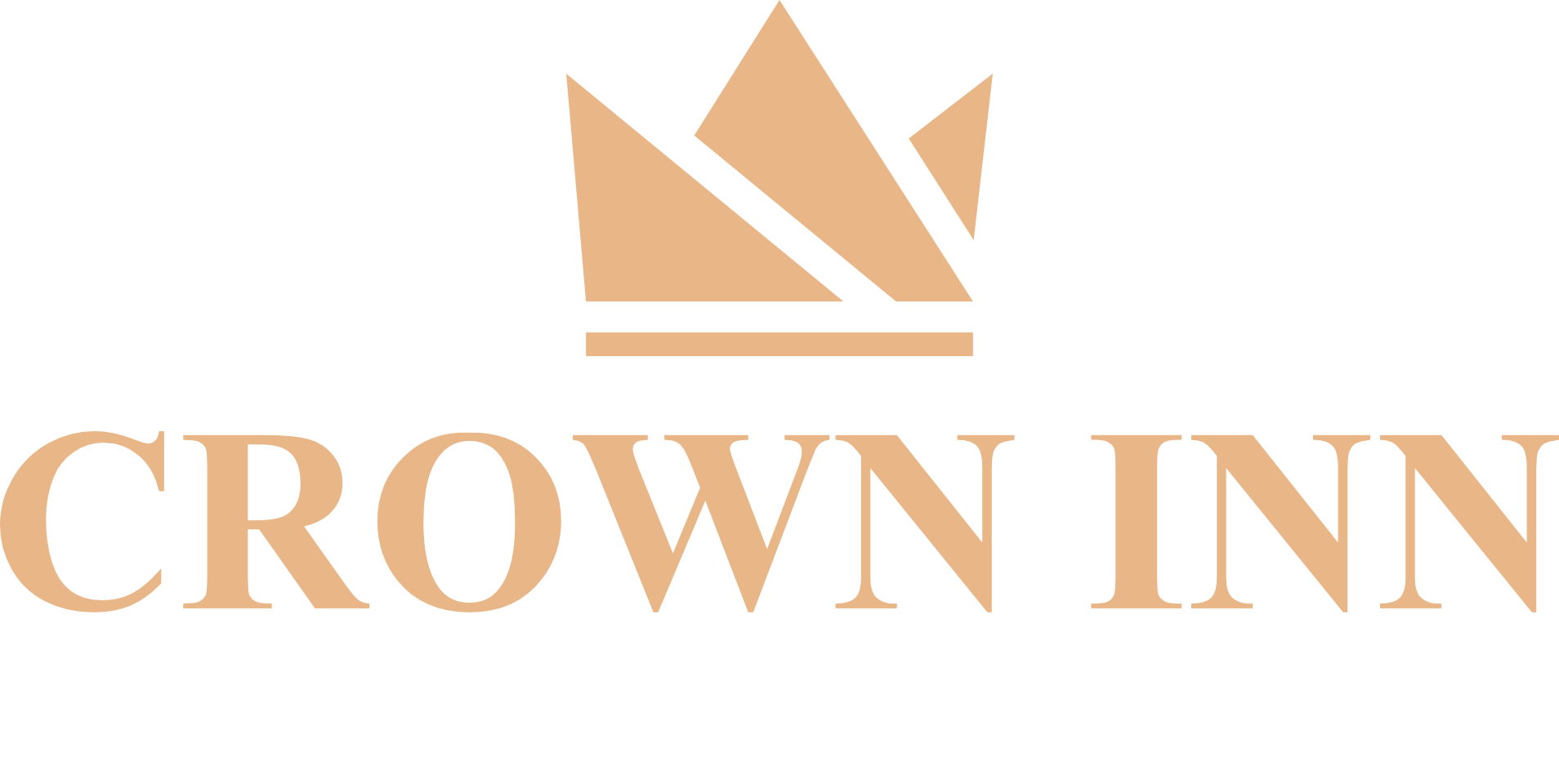
Great article! I appreciate the clear and insightful perspective you’ve shared. It’s fascinating to see how this topic is developing. For those interested in diving deeper, I found an excellent resource that expands on these ideas: check it out here. Looking forward to hearing others’ thoughts and continuing the discussion!
The insights shared in this article are really valuable. The author’s approach to the topic was refreshing. I’m eager to hear different perspectives on this. What did you find most compelling?